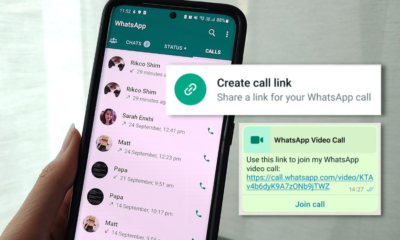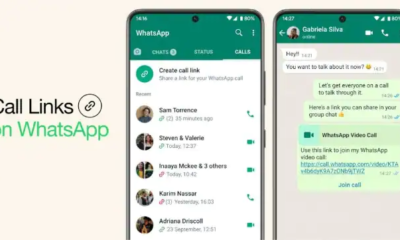Social Media
WhatsApp Shows How Phone Carriers Lost Out on $33 Billion


Facebook Inc. (FB)’s $19 billion purchase of mobile-messaging startup WhatsApp Inc. is a stark reminder of how much money phone carriers are losing out on as competitors let users text and chat at no charge.
Free social-messaging applications like WhatsApp cost phone providers around the world — from Vodafone Group Plc (VOD) to America Movil SAB (AMXL) and Verizon Communications Corp. — $32.5 billion in texting fees in 2013, according to research from Ovum Ltd. That figure is projected to reach $54 billion by 2016.
As more customers have switched to smartphones with better Internet access, people are relying more on applications such as WhatsApp to communicate. Instant-messaging services have taken off outside the U.S. where carriers don’t throw unlimited texting into voice and data plans. The rise of these applications has offered a cheaper source of communication, especially for correspondence between different countries, undercutting the texts that had once been a key source of income for carriers worldwide.
“The trend has been that messaging is eating away into that revenue, in some countries more than others, and that trend will continue,” Chetan Sharma, an independent wireless analyst in Issaquah, Washington, said in an interview. “The impact of free messaging has been felt worldwide. WhatsApp has clearly been the cream of the crop.”

Representatives for Newbury, England-based Vodafone, Mexico City-based America Movil and Overland Park, Kansas-based Sprint Corp. (S) didn’t respond to requests for comment on the impact from free messaging applications. A representative for Dallas-based AT&T Inc. (T) declined to comment.
WhatsApp Growth
The Bloomberg World Telecommunications Index of 89 companies rose 0.6 percent today.
Facebook, the world’s largest social network, said this week that it’s buying WhatsApp in a deal that values each of its 450 million active monthly users at $42. Free for the first year and 99 cents annually thereafter, WhatsApp is almost always cheaper than texting, especially across national borders.
With a particularly strong following in Europe, India and Latin America, the service is rapidly displacing traditional text messaging as the preferred method for young people to stay in touch on mobile devices. Mark Zuckerberg, Facebook’s 29-year-old chief executive officer, said he expects WhatsApp to reach more than 1 billion people worldwide in the next few years.

WhatsApp, Rebtel, Viber, KakaoTalk and other services use the Internet to send data instead of a cellular network, allowing users to send text, multimedia and voice messages for free, or close to it.
Texting Decline
As free services continue to gain in popularity, U.S. text-messaging revenue will decline 3 percent to 4 percent this year from $21 billion in 2013, Sharma estimated. Globally, carriers’ texting revenues will peak by 2016 and then start to drop as well, he said.
The apps have eroded such revenue for several years and were a big reason why U.S. carriers began to include unlimited SMS in many of their service plans, Roger Entner, an analyst at Dedham, Massachusetts-based Recon Analytics LLC, said in an interview. The first SMS, or short message service, text was sent over Vodafone’s network in 1992.
“The wireless carriers were very concerned that WhatsApp and others would intermediate them,” Entner said. “So the wireless carriers found the most consumer-friendly solution — they gave it away, too. And that took away the incentive to join WhatsApp.”
Mexico Popularity
However, carriers in other parts of the world still charge high fees for texts, and their revenue will be affected as WhatsApp’s popularity spreads, Entner said.
In Mexico, for instance, almost 90 percent of all instant messaging goes through WhatsApp, according to Ernesto Piedras, director of the Competitive Intelligence Unit, a telecommunications consulting firm based in Mexico City.
“From about a year and a half ago, WhatsApp use in Mexico has become overwhelming,” he said in an interview. “It’s convenient to use, and the more people have it, the more people use it.”
Six to eight years ago, phone companies in Mexico generated about 15 percent of their revenue from text messaging, Piedras said. Now it’s less than half of that.
WhatsApp also had an impact in Holland, where carrier Royal KPN NV (KPN) didn’t offer free texts as a part of its bundles, Mark Little, a London-based consumer analyst at Ovum, said in an interview.
International Plans
“KPN’s SMS revenues plummeted because people used something better and free,” he said. “Other regions haven’t made the same mistake.”
Many carriers’ international-texting revenue may be in limbo. Five percent to 10 percent of U.S. wireless subscribers send a significant number of texts to friends and relatives overseas, Charles Golvin, an independent wireless analyst, said in an interview. They often pay 20 cents to 25 cents for a plain text message, and as much as 50 cents per multimedia message.
“Facebook might encourage U.S. users to be more aware of WhatsApp as an alternative,” Golvin said. “We might see the carriers start to reduce their fees for international messages, or bundle their international messages into a package.”
Most U.S. carriers have moved to flat-rate, unlimited text messaging offers. AT&T, for example, has a $10 a month plan that includes international texts. Users on that plan are limited to 100 messages and charged 20 cents per message afterward.
‘More Everything’
When asked about the threat to text-messaging revenue from apps like WhatsApp, Debi Lewis, a spokeswoman for New York-based Verizon, said the company includes unlimited messaging as part of its shared data plans. Last week, Verizon added unlimited international text and multimedia messaging to the “More Everything” pricing plans.
For Telus Corp., Canada’s second-biggest wireless operator, data charges account for 45 percent of its wireless network revenue, according to Joseph Natale, the Vancouver-based company’s chief commercial officer.
“Increasingly, we’re seeing customers use more applications for communication, whether they are text-based or social media-based applications or over-the-top type voice applications,” he said in an interview last week. “Over time, what will happen is that voice and text will become more of a feature attached to your data plan.”
“At some point everything becomes a data service,” Natale said.
Texting isn’t dying anytime soon, Ovum’s Little said.
“At the moment, the telcos have actually been responding to the use of free social messaging by including lots of free SMS in their” bundles, he said. “However, WhatsApp does offer a very sleek and simple, high-quality user experience that one might argue the old interface of SMS or texting doesn’t.”
source:http://www.bloomberg.com/news/2014-02-21/whatsapp-shows-how-phone-carriers-lost-out-on-33-billion.html







